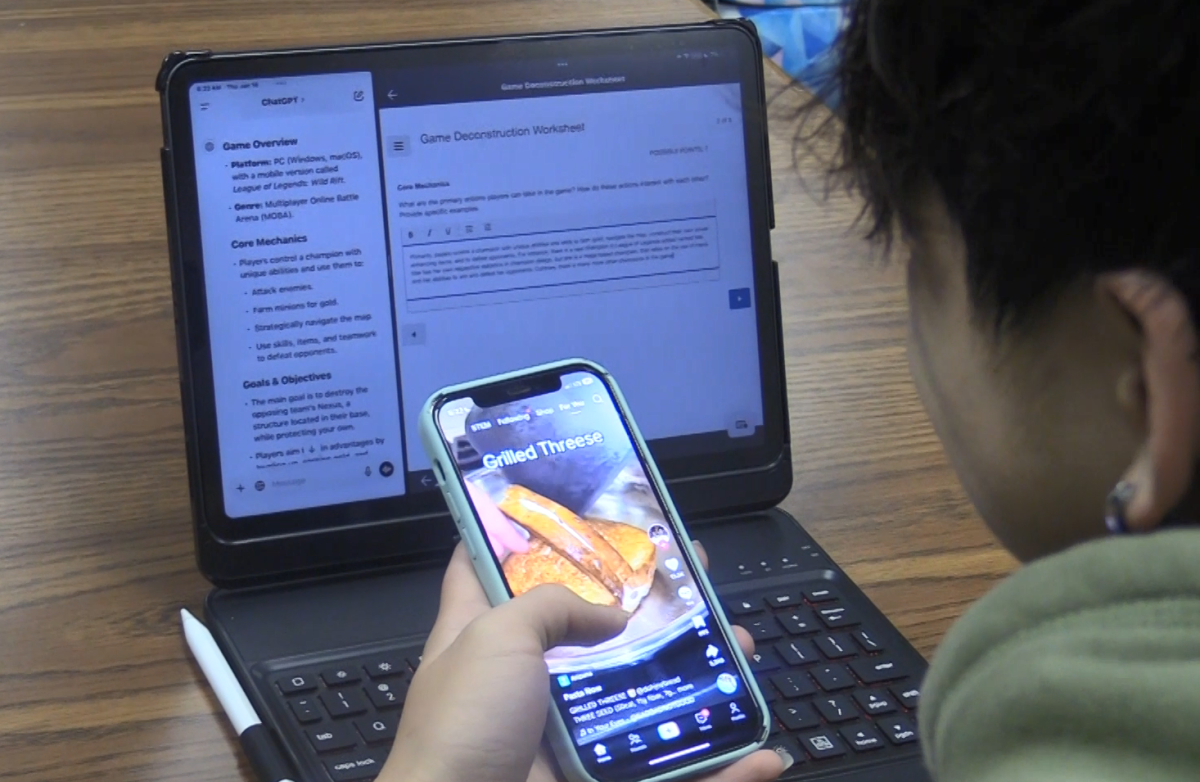No time to waste. With furrowed brows and gaping yawns, students exhaustively pull all nighter to finish their PAK. This year, most AP courses were shortened from three terms to two, throwing both students and teachers into a whirlwind of stress and adaptations. Students taking AP U.S. History, AP English III, AP Chemistry and AP Biology are affected by this change.
Junior Nicole Perrino experienced the increased pressure and challenges that come in the new system with her AP English III class.
“[AP English III] seems easy, but once you start the work, it’s a very humbling class,” Perrino said. “I’m definitely stressed a lot more, checking my grades, making sure I’m not failing anything…I’m up at night, sometimes staying up until 2 or 3 AM making sure that I’m studying the way I need to prepare for my AP test. We just need more time…We have less time to prepare for an AP test that is going to determine my future. It’s definitely a struggle, but I’m getting there.”
AP courses are notorious for their rigorous and demanding workload, but the change has made it even more challenging for students. Senior Usivuyise Dapo experiences this in the stress of taking AP Biology.
“I’d say AP Bio would probably be the most rigorous AP course I’ve taken, especially considering the fact that it’s dropped from three to two terms now, and because AP Bio is a very content-heavy class, I feel like it’s slowly starting to pile up as of lately,” Dapo said. “I end up staying up pretty late a lot of nights, studying, making sure that I fully understand everything I’m reading, and writing postcards for memorization.”
As the officer of many clubs, Dapo struggles to balance his time and responsibilities.
“I’ve realized that through the other clubs that I’m involved in, it ends up taking quite a lot of time out of my day, specifically with being a historian for NTLB,” Dapo said. “I realized in addition to all the work I have, I end up taking a lot of time helping my mentees so that takes half my day away. If I have deadlines I have to make, it is a lot harder to maintain my grades and split my time. I end up spending the time I would spent studying to help others with their homework. I then ended up sleeping late doing my own work. ”

Teachers also had to adjust their lesson plans to accommodate the new schedule.
“I am doing most of what I did when I taught three terms. I’m trying to streamline the instruction a little bit so students hopefully get the instruction more quickly,” AP English III teacher Ayn Nys said. “I’m also going to be providing them with practices they can do online even after the course is over. I don’t know how that will impact their scores, but I remind them that it’ll be up to them whether or not they practice.”
She has struggled to adapt to the new schedule.
“I feel pulled in multiple directions,” Nys said. “I would say my workload and stress have been higher since I’m staying at school a lot later. Now, I’m hoping that is just an adjustment, and I’ll be able to figure things out a little bit better. But the other thing that it requires me to do is it requires me to multi task, and that can be really hard when any AP class requires a lot of instruction on the teacher’s part.”
College counselor Laura Tully suggests students establish routines to handle the change.
“I was in a training over the summer that was talking about the power of routine and how important it is to make sure that we are scheduling adequate sleep and good exercise,” Tully said. “When you are stressed and overwhelmed, it seems like, of course, I can’t sleep because I don’t have time, right? But you work slower. I’ve been on a passion project for 10 years here at Kerr to get kids to sleep.”
“Every time a kid opens Schoology after 10 PM, I wish I could put a screen up that says: ‘TULLY SAYS TO GO TO SLEEP!’”








